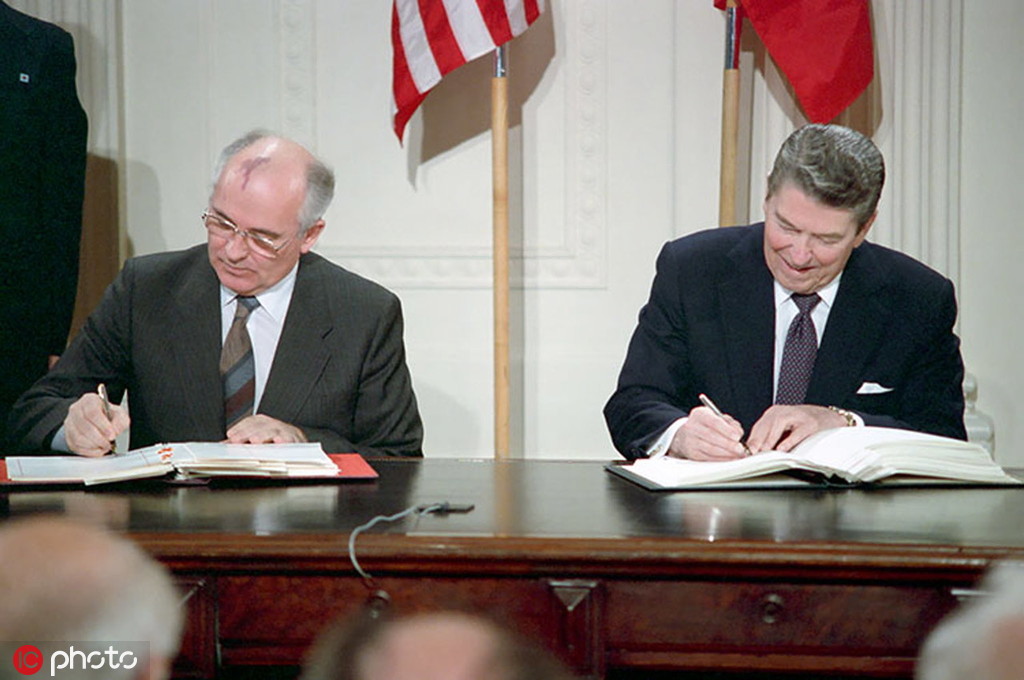US exit from INF a 'great blow' to global security






Experts warn it would further dampen Washington-Moscow relationship
The Intermediate-Range Nuclear Forces Treaty, or INF Treaty, signed between Washington and Moscow in 1987, ended when the United States formally withdrew from the treaty on Friday. Experts warned the move is bound to weaken mutual trust between the major powers, encourage nuclear arms race, and raise the level of risk in the world's security landscape.
Washington unilaterally started the withdrawal process in early February, citing Russia's violation of the deal. Moscow, which has repeatedly denied Washington's accusation, also suspended its participation in the INF Treaty, the first-ever pact reached by the two sides on nuclear disarmament and a major step forward in restricting arms race.
The INF was negotiated by then-US President Ronald Reagan and Soviet Union leader Mikhail Gorbachev. It banned land-based missiles with a range between 500 and 5,500 kilometers, reducing the ability of both countries to launch a nuclear strike on short notice. It played a major role in maintaining the strategic balance in Europe and keeping the peace between the NATO and the Warsaw Pact countries.
Experts worry that the annulment of the nuclear control pacts will eventually lead to a more complex and dangerous relationship between Washington and Moscow in the future.
William Perry, former US defense secretary, tweeted that "the US withdrawal from the INF Treaty today deals a great blow to nuclear arms control and global security, we are sleepwalking into a new arms race".
Zhang Yifei, a researcher of Chinese Academy of Social Sciences, said the withdrawal of the US from the treaty is expected to damage global security. It will further dampen US-Russian relations and could open the door to a dangerous new era of unconstrained military competition between the US and Russia, Zhang said.
"The current course will lead to a less stable and secure world. The United States and Russia will be less able to predict future developments on the other side and thus will have to make expensive worst-case assumptions," Steven Pifer, a nonresident scholar with the Brookings Institution think tank told Xinhua News Agency.
Viktor Murakhovsky, a Russian defense analyst, said it makes no military sense for both US and Russia to start a new arms race by increasing their launchers and nuclear warheads, but the competition in the realm of military technology will continue between the two countries after the death of the treaty.
"The situation in this area is already very difficult and it will only get worse, something catastrophic will happen to the military-political trust between the US and Russia." Murakhovsky said.
UN Secretary-General Antonio Guterres also lamented that with the demise of the INF Treaty, the world lost an invaluable brake on nuclear war.
In fact, the worries are not overreacting. Hours after the collapse of the historic arms control pact, the Pentagon announced that the US will fully develop ground-launched conventional missiles. Russia's Deputy Foreign Minister Sergei Ryabkov has warned that if Washington deploys missiles prohibited by the treaty near Russia's border, his country reserves the right to respond in kind.
"It is a pity that rather than renegotiate the treaty to suit the times, both sides chose, for their own purposes, to mutually abandon the treaty and its structure," said Larry Cata Backer, a professor of law and international affairs at Pennsylvania State University.
Backer said the death of the treaty is a reminder for the European Union that the old assurances of the detente between the US and the Soviet Union have at last been swept away and, as a result, the EU might face higher security risks.
In a recent report, Russian newspaper Izvestia said that collapse of INF Treaty hurts everyone, notably Europe.
Izvestia said it is necessary to begin working on a new arms agreement and the EU should support any initiative that would lead to the signing of such a document. Despite the termination of the treaty, Russia said it is ready to return to the implementation of that key arms control accord, according to Konstantin Kosachev, chairman of the Foreign Affairs Committee of the Russian Federation Council, the upper house of the Russian Federation parliament.
Kosachev said Russia is not burying the INF Treaty, and it is ready to get back to it at any time, "if the US also does so".
Zhang Jing in Washington contributed to this story.





























